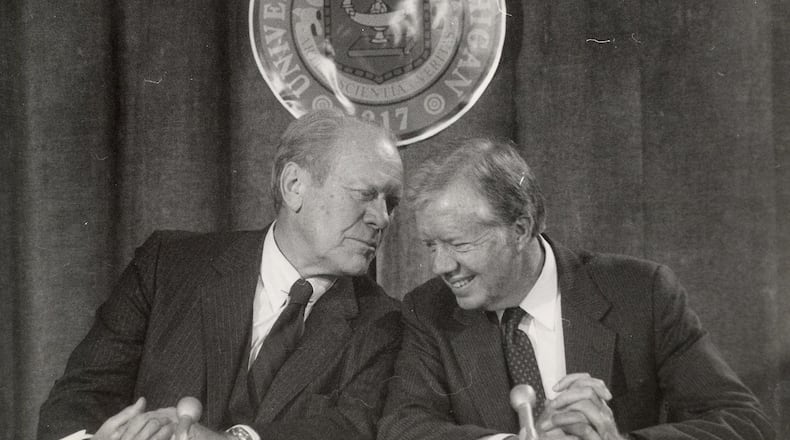From the Nobel Peace Prize to several Grammys, former President Jimmy Carter’s won nearly every major honor available.
But the 2017 Gerald R. Ford Medal for Distinguished Public Service comes with one heck of a backstory.
Carter couldn’t attend Monday night’s Gerald R. Ford Presidential Foundation dinner in Washington D.C. where the award was announced; instead, he received the medal at the Carter Center in Atlanta last month in a ceremony that included Steven Ford, whose father Carter defeated in 1976 in one of the closest presidential elections ever -- then went on to form a remarkable friendship with.
Credit: Bill Mahan
Credit: Bill Mahan
"As I reflect back on more than 25 different projects that Jerry and I collaborated and shared leadership (on), I can't help but be grateful for the mutual respect and the intense personal friendship that developed during that time together," Carter, 92, said in a video from the presentation."The words I spoke about my dear friend both at my inauguration and his funeral still ring true today. 'For myself and for our nation I thank my predecessor for all he did to heal our land.'"
Related video: Steven Ford presents the 2017 Gerald R. Ford Medal for Distinguished Public Service to Jimmy Carter
Ford unexpectedly became president in August 1974 when Richard Nixon resigned at the height of the Watergate scandal. Soon after Carter left the White House in 1981, he and Ford found themselves bonding during a long flight from Cairo and the funeral of their mutual friend, Egyptian president, Anwar el-Sadat. They monitored elections together, swapped notes on building presidential libraries, and gradually became close enough that Ford even asked his onetime rival to speak at his funeral someday.
Ford died at 93 in 2006. In his eulogy, Carter cited their shared bios as Navy veterans and husbands of “good-looking, smart and extremely independent” women, then quipped, “And we both enjoyed our unexpected promotion to commander in chief.”
Credit: Roberto Schmidt
Credit: Roberto Schmidt
The Ford medal went to Carter for his “significant foreign policy achievements,” including the Camp David Accords, and for championing human rights and disease eradication while in and out of office. But Steven Ford, citing “the current toxic times,” said that his father and Carter also deserved credit for “illustrat(ing) to the nation that politics can be handled with dignity, class and respect.”
Something similar seemed to be on Carter’s mind.
“I hope you continue the heritage of Gerald R. Ford,” he concluded his remarks to those assembled in Atlanta, “Of integrity and honesty and truthfulness, and competence in public service.”
About the Author
Keep Reading
The Latest
Featured





